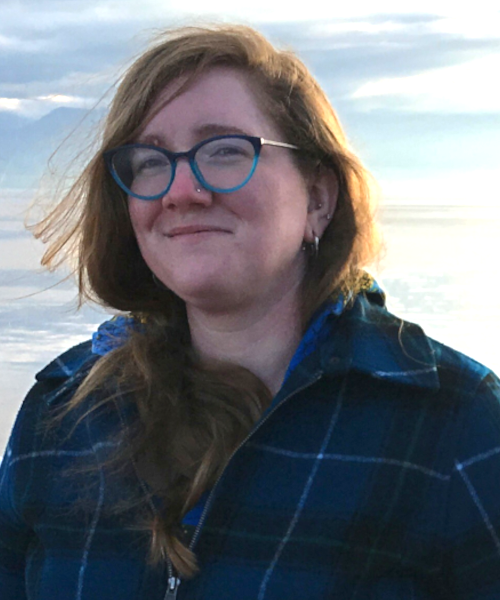
Anna Belew (PhD 2020), Executive Director of the Endangered Languages Project
Dr. Anna Belew, who graduated with a doctorate from the University of Hawaiʻi at Mānoa Department of Linguistics in 2020, is currently the Executive Director of The Endangered Languages Project (ELP), a nonprofit dedicated to supporting individuals and organizations worldwide working to preserve and protect their endangered heritage languages. She is also adjunct faculty in the Department of Linguistics.
Anna started working with ELP while she was still a graduate student in linguistics. At the time, she was conducting sociolinguistic language documentation in the Iyasa-speaking community in southern Cameroon and northern Equatorial Guinea. Her dissertation, Sociolinguistic Documentation of Language Shift and Maintenance in Iyasa, examines Iyasa people’s perceptions about language use in daily life. “Sociolinguistic language documentation was still a fairly niche specialization when I started the PhD program, but I wanted to bring together qualitative and quantitative sociolinguistic inquiry to study language shift and maintenance,” Anna recalls.

Prior to finishing her dissertation, Anna took a full-time position with ELP in 2018 as Outreach Coordinator. “My job was essentially to tell interested people about the ELP, and invite them to participate.” Anna says she was also given a lot of opportunities to expand ELP programming, which included online webinars in language documentation. The webinars were developed in partnership with the Language Documentation Training Center initiative in the Department of Linguistics. Anna was later promoted to Program Manager and, in partnership with Dr. Amanda Holmes, another staff member, worked to develop an internship program, additional online courses, and more resources for language communities looking to develop their language reclamation programs.
During her degree program, Anna worked as a graduate assistant on the Catalogue of Endangered Languages, the scholarly database that underlies the language information displayed on the ELP website. “The Catalogue played a big part in how I decided to undertake research with the Iyasa community,” says Anna. “I had already been working in Cameroon on a larger, more stable language, but I knew I wanted to focus my research efforts on the language endangerment sphere. So I opened the Catalogue of Endangered Languages, looked at a map of Cameroon, found some of the red dots [for endangered languages], and reached out to people with contacts there.” Anna spent several summers in the Iyasa community, conducting field research in French, which was an interesting challenge. “That time definitely improved my French, making it a lot more Cameroonian than the Parisian French I’d learned as a child.”
“Our scope is global,” says Anna, “which means there are roughly 3,500 language communities in the world we could be working with.” ELP recently launched a mentorship program, in which language revitalization practitioners from Cameroon, Tibetan Plateau, Mexico, and Ireland are available for one-on-one sessions with individual language workers to offer guidance and resources. “Our mentors provide encouragement and someone to chat with who understands the importance of language revitalization work. It’s very exciting.”
Anna credits her time at UHM with setting her on the path toward her current career. Anna says when she finished her MA, she researched PhD programs, and only UHM Linguistics offered the kind of education in language documentation she was seeking. “I attended my first ICLDC [International Conference on Language Documentation & Conservation] before I applied, and I could just tell from the energy that there was a real joy and passion around language in the department. I didn’t even apply anywhere else.” The department’s courses in specialized topics were a draw for Anna, as was the focus on ethical research. “I think we weren’t yet calling it relational work at the time, but that focus was really important. Ethical conduct, prioritizing community goals, aspirations and sovereignty were always front of mind at UH.”
Anna also appreciated the encouragement she received from her professors to study something new. “I came in with a lot of research goals that were sort of out of left field. There wasn’t anyone in the Department working in Africa at the time, or combining sociolinguistics with language documentation, but the faculty urged me to follow the path I wanted to follow. That kind of flexibility is really important.”
In fact, Anna urges current and future students to seek out the kind of flexible mentoring she received at UH. “Follow what your gut says you’re supposed to be doing, even if there isn’t a clear-cut path to the kind of research you want to do.” Anna also suggests that students keep in mind that humility is a strength in academia. “If you feel like you don’t have all the answers, well, that means you’re doing it right!”
Anna remains very connected with the Department of Linguistics, which is still the home of the Catalogue of Endangered Languages. “I am lucky to have the chance to liaise with current graduate students who are working on the Catalogue.” Anna has also taught online classes in the department: she co-taught a graduate-level course in language documentation with Professor Berez-Kroeker in 2021, and in 2023 she taught a 100-level course in endangered languages. ELP also still partners with the Language Documentation Training Center every fall to put on a series of webinars for an international audience.
ELP became an independent nonprofit in 2024, and Anna is looking forward to seeing what the future of the organization holds. “We’re really excited to be moving forward, in a direction where we can broaden and deepen our relationships with language workers around the world, and develop the kinds of services and resources they need to keep their languages strong.”
